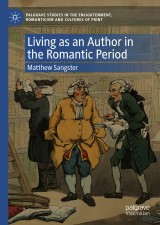Details

Living as an Author in the Romantic Period
Palgrave Studies in the Enlightenment, Romanticism and Cultures of Print
|
CHF 130.00 |
|
| Verlag: | Palgrave Macmillan |
| Format: | |
| Veröffentl.: | 27.01.2021 |
| ISBN/EAN: | 9783030370473 |
| Sprache: | englisch |
Dieses eBook enthält ein Wasserzeichen.
Beschreibungen
<p>This book explores how authors profited from their writings in the late eighteenth and early nineteenth centuries, contending that the most tangible benefits were social, rather than financial or aesthetic. It examines authors’ interactions with publishers; the challenges of literary sociability; the vexed construction of enduring careers; the factors that prevented most aspiring writers (particularly the less privileged) from accruing significant rewards; the rhetorical professionalisation of periodicals; and the manners in which emerging paradigms and technologies catalysed a belated transformation in how literary writing was consumed and perceived.</p><p></p>
<p>1. Introduction: What was an Author in the Romantic Period?.- 2. Chapter One: Publishers, Book Production and Profits.- 3. Chapter Two: Sociable Alignments.- 4. Chapter Three: Succeeding in ‘the Worst Trade’.- 5. Chapter Four: The Working Writer.- 6.Chapter Five: The Oligarchs of Literature: Authority and the Quarterly Reviews.- 7. Chapter Six: Refashioning Authorship’s Purview.- 8. Coda: Print Proliferation and the Invention of the Artist</p>
<p>Matthew Sangster is Lecturer in Eighteenth-Century Literature and Material Culture at the University of Glasgow, UK. He has published widely on Enlightenment libraries, literary institutions, Romantic metropolitanism, media culture, and the affordances of Fantasy.<br></p><p></p>
<p>‘<i>Living as an Author in the Romantic Period</i> seeks to explode the notion that the late eighteenth and early nineteenth centuries oversaw a transformation of the literary economy into one in which professional authors could make a living exclusively off their writing. The author’s detailed work with neglected archives, especially publishers’ ledgers and the Royal Literary Fund papers, fuels several original claims about authorship in the romantic period. This is a book that will matter and possibly even be field-changing.’</p><p>— Michael Gamer, British Academy Global Professor (QMUL) and author of <i>Romanticism, Self-Canonization, and the Business of Poetry</i> (2017)</p><p><br></p><p>‘Matthew Sangster’s new book provides a compelling revision of the standard account of the advent of professional authorship in the early nineteenth century. Using remarkable archive material from publishers combined with other institutional records folded into engrossing case histories of individual writers, <i>Living as an Author in the Romantic Period</i> reveals that the death of patronage has been prematurely announced. Even as writing became bound up with an array of networked cultural activities in a reconstituting field of literary production, marvellously brought to life in Sangster’s study, the career of the writer as a singular occupation remained out-of-reach for most of its aspirants.’</p><p>— Jon Mee, Professor of Eighteenth-Century Studies, University of York, UK</p><p><br></p><p>This book explores how authors profited from their writings in the late eighteenth and early nineteenth centuries, contending that the most tangible benefits were social, rather than financial or aesthetic. It examines authors’ interactions with publishers; the challenges of literary sociability; the vexed construction of enduring careers; the factors that prevented most aspiring writers(particularly the less privileged) from accruing significant rewards; the rhetorical professionalisation of periodicals; and the manners in which emerging paradigms and technologies catalysed a belated transformation in how literary writing was consumed and perceived.<br></p><p></p>
Uses previously-underutilised archives to show that during the Romantic period, authorship operated principally as a relatively restricted social system, rather than a profession or mode of artistic practice Discusses the careers of a diverse range of writers, including Robert Southey, Thomas Moore, Felicia Hemans, Robert Heron, Eliza Parsons, Robert Bloomfield, Hannah More, Walter Scott and Lord Byron Establishes the crucial mediating roles played by larger assemblages, including the publishing industry; political coteries; privileged families; regional, national and global networks; and periodical culture
<p>“<i>Living as an Author in the Romantic Period</i> seeks to explode the notion that the late eighteenth and early nineteenth centuries oversaw a transformation of the literary economy into one in which professional authors could make a living exclusively off their writing. The author’s detailed work with neglected archives, especially publishers’ ledgers and the Royal Literary Fund papers, fuels several original claims about authorship in the romantic period. This is a book that will matter and possibly even be field-changing.” (Michael Gamer, British Academy Global Professor (QMUL) and author of Romanticism, Self-Canonization, and the Business of Poetry(2017))</p><p>“Matthew Sangster’s new book provides a compelling revision of the standard account of the advent of professional authorship in the early nineteenth century. Using remarkable archive material from publishers combined with other institutional records folded into engrossing case histories of individual writers, <i>Living as an Author in the Romantic Period</i> reveals that the death of patronage has been prematurely announced. Even as writing became bound up with an array of networked cultural activities in a reconstituting field of literary production, marvellously brought to life in Sangster’s study, the career of the writer as a singular occupation remained out-of-reach for most of its aspirants.” (Jon Mee, Professor of Eighteenth-Century Studies, University of York, UK)</p><div><br></div>
Diese Produkte könnten Sie auch interessieren:

The Enigma of Good and Evil: The Moral Sentiment in Literature

von: Anna-Teresa Tymieniecka

CHF 354.00















